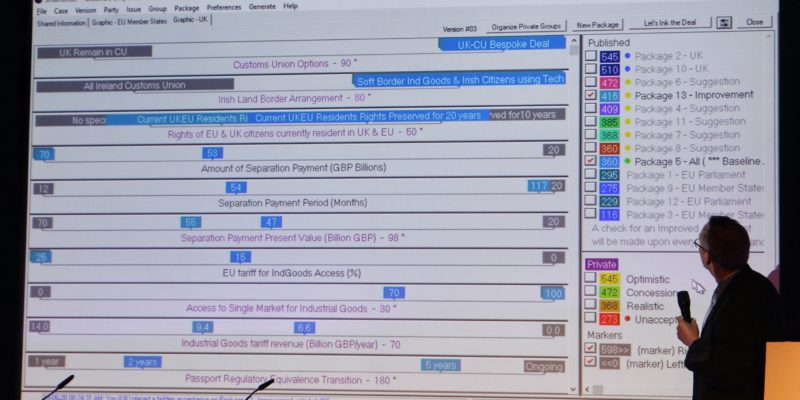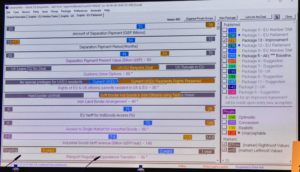In this blog I discuss the rise of ODR (online dispute resolution). I review recent developments including a live, online Brexit negotiation, which point to a mainstream future. I conclude that ODR will become an integral part of the justice system.
When Frank Sander coined the term ‘Alternative Dispute Resolution’ his relatively modest proposal placed the courts at the centre of the legal firmament. The new ‘multi-door courthouse’ might be orbited by mediation or arbitration but it remained a courthouse. People had to attend, with or without lawyers, to get justice, or at least a result. Other ADR processes were just that: alternatives. So when I first came across ODR (online dispute resolution) I rather unthinkingly saw it as an alternative to an alternative, useful for the small percentage of mediators and clients blessed with ‘techno joy’ (an Eddie Izzard term) and decent broadband.
I stand corrected. Over two days last June at the ‘Online Dispute Resolution: Justice Re-Imagined’ conference in Liverpool (see http://www.odrconference.com) my mind was truly blown. It seems clear that ODR will leapfrog ADR and become, not just an alternative, but an integral part of the justice system. Some developments are incremental and simply sensible; others are exponential and seem the stuff of fantasy.
A few examples
At the incremental end of ODR are online court systems and digital mediation platforms. Online technologies process matters faster and more conveniently. Why shouldn’t consumers file their court actions whenever and wherever they choose? Why should they produce written documents when online forms guide us through all kinds of everyday transactions?
In England and Wales the Traffic Appeals Tribunal’s Fast Online Appeals Management System, run from a small office in Cheshire, deals with parking disputes from over 300 local authorities. An intuitive, comprehensible portal enables people to upload and annotate photographs and state their case.
For personal injury claims of £1,000 to £25,000 Claims Portal manages the whole claim process online, providing a “safe and secure electronic means of communication”.
Turning to the USA, Paul Embley of the National Center for State Courts (NCSC) raised a chuckle with a quote on courts’ usual approach to innovation: “yesterday’s technology tomorrow” (Tom Clarke). He outlined a wave of ODR initiatives across various states, predicting that soon ODR with be the “primary door” for entry into the courts. But ODR’s impact will extend far beyond convenient filing: see the “Courts Disrupted” report (in which Paul had a hand).
Digital Disruption
Digital disruption is not a new idea. We are all familiar with the tsunami of change unleashed by Amazon, Uber and their likes. Almost overnight these entrepreneur/innovators wrought radical transformation, not just for their competitors (see the rash of UK “Death of the High Street” headlines) but for whole societies. The idea of “going Christmas shopping” has probably changed for ever. We go instead to our laptops and smartphones using another digital disrupter, Google, to find the world’s best prices. And how many of us glance fondly at the little video-game of a taxi on the way, thinking back to the olden days (a couple of years ago) when you couldn’t find a cab at any price?
The US report explains that digital disruptors tend to improve one or more of the following: cost, customer experience and ‘platform’ (“a unique digital space where providers and consumers can find each other easily and effectively”). New platforms combining improved price and a better experience are particularly effective because they can be scaled up at almost no cost, creating demand where none existed. The more users, the better they work – think of eBay or Facebook. Traditional courts, on the other hand, “work more slowly and less effectively when more people use them, opening the way for dramatic disruption.” Among the most significant sources of disruption is ODR.
Courts are vulnerable precisely because of their strengths, providing individualised, accurate and justifiable decisions, rendered in real-time by a cast of highly trained professionals, in imposing, expensive public buildings. But they are increasingly beyond the reach of the majority of individuals or even businesses. Following the logic of other disruptors it is only a matter of time before technology entrepreneurs create a new offering that sweeps away much of the old.
Big Data
Moving to the exponential end of ODR we find the worlds of big data and artificial intelligence. Big data has already altered the landscape in areas like marketing and healthcare. Why not the courts? If 100,000 people complain about a company in 10,000 local courts around the world it barely registers. But if a single platform can instantly harness those data the consequences may be very different. This is one of the principles behind British platform Resolver. Resolver has already dealt with 3 million consumer complaints, exploiting a blend of traditional and novel approaches. The traditional part consists of guidance and template letters that enable consumers to raise proceedings, supplementing but not supplanting the courts. More novel, however, is its understanding of the power of reputation and willingness to publish its data, the ‘Resolver League Table‘ becoming an annual beauty contest of the companies who resolve complaints most effectively. And sleeping giant Google is beginning to harness its massive data resource in the interest of justice reform – see Measures for Justice and related projects.
AI (And Brexit re-imagined)
Artificial intelligence is probably the frontier at which ODR provokes the most alarm. The idea that algorithms can be trusted with justice decisions sounds either horrifying or fantastical. So perhaps the conference’s most astounding moment was watching an AI system, SmartSettle, negotiate Brexit. This may raise a wry smile from British and European readers given Brexit’s enduring non-negotiability. To be accurate, this demonstration showed AI improving, rather than replacing, human decision-making.
First the algorithm was provided with large amounts of data on 10 major headings, from fisheries to the Irish border, with the most advantageous outcome producing the highest score. Then each side negotiated internally (often the hardest part) to produce its ‘ideal world’ position, and a very high score. Unsurprisingly neither ideal world was acceptable to the other, so there followed a series of trades. The beauty of the platform was its ability to show negotiators the impact of each trade at a glance, not only on their own side BUT ON THE OTHER. So in minutes each side can map out the BATNA and WATNA (courtesy Fisher, Ury and Patton) for itself and its counterpart. All of this helps negotiators reach the ‘pareto-optimal frontier’ – where each side benefits as much as possible without harming the other. And in a final piece-de-resistance the algorithm took the final negotiated deal and improved it – at the push of a button, both side’s scores increased!
Where does it leave humans?
Of course AI can’t yet do politics. In the real world, wherever that is, negotiations collapse over issues immune to logic and trade-offs. However, this demo provided a glimpse of ODR’s potential to support informed decision-making. Digital disruptors work by doing things better. If they don’t improve matters for their users, they don’t work and they don’t disrupt.
A few years ago I heard Richard Susskind, a prophet of digital disruption, explain the implications of Moore’s law. Moore’s law holds that computer processing power will double every two years. So if we wait long enough technology tends to catch up with great ideas, no matter how impractical they may once have seemed. Skype has been around for a while, but the rise of smartphones and tablets has placed video-phones within the reach of the majority. And so with ODR. Improved technology may render the term ‘online’ redundant and ‘online dispute resolution’ will become simply ‘dispute resolution.’
And where does it leave mediators? Not yet redundant, I’d guess. Challenges there are, though. The mediation profession is dominated by the middle-aged, if not elderly, a demographic that finds change tricky. Just because something didn’t work yesterday doesn’t mean it won’t work tomorrow. And just because I didn’t learn how to mediate or negotiate online doesn’t mean the next generation won’t. I’m laying down the gauntlet to myself as much as anyone else, to adapt and innovate and ensure that ADR doesn’t become a quaint historical episode on the road to ODR.
________________________
To make sure you do not miss out on regular updates from the Kluwer Mediation Blog, please subscribe here.





Good challenge Charlie. Things will change. The choice may be between keeping up or falling behind. Will any of us be ahead?
Thanks John. We live in interesting times(!) as someone once said.
Thanks for this overview Charlie – and of course I am bound to agree with your assessment of where we’re going with ODR . . . Indeed, we’re getting beyond “ODR” with its implications of being a digital variant of ADR. As AI, algorithms, blockchain etc gather speed, the landscape is changing hugely. What also matters, at the same time, is ensuring that these developments are driven as much by values and principle as they are by technological enthusiasm. See for example: https://aeon.co/videos/algorithms-are-opinions-not-truth-machines-and-demand-the-application-of-ethics. All the best, Ian
Thanks Ian. Fascinating stuff and you’re right about values and principles – but interesting that at least some of the innovations are driven by the urge to right wrongs and include the excluded.
Charlie
This is an interesting post indeed. ODR help provide for access to justice to those who could afford going through “traditional” court system. The issue of using digital platforms or technology have moved beyond simply say case management. In the not so distant future, ODR will play main role in resolving disputes. One would expect resistance to change, but ultimately ODR will prevail. Bashar H. Malkawi
Sorry to be seeing this late, Charlie – but many thanks for your post. The conference website has now been closed so the link you gave will not work. For those interested the programme can be seen at https://tinyurl.com/odrjune2018 All the papers are being published in a special edition of the International Journal on Online Dispute Resolution.
By way of update on ODR , please see article on first use of blind bidding (Smartsettle ONE) to resolve litigation at https://www.legalfutures.co.uk/latest-news/robot-mediator-settles-first-ever-court-case